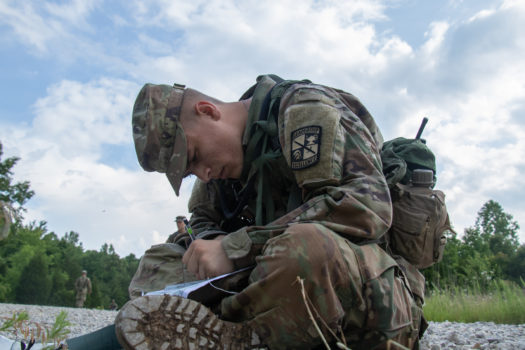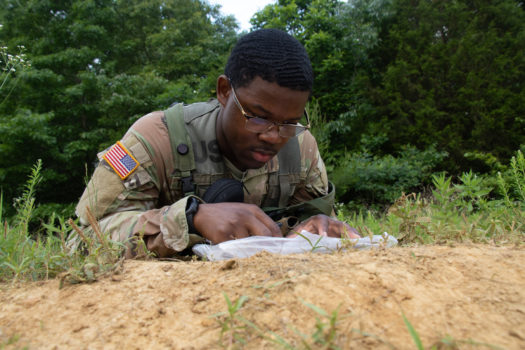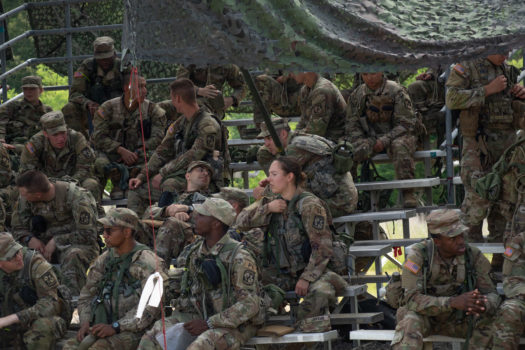2nd Regiment Cadets tested on land navigation for Cadet Summer Training (CST) at Fort Knox, Ky., on June 6, 2022.
Staff Sgt. Lana Bansbach, with the 2nd Battalion of 319th Regiment, has been working on land navigation for five years. She said the Cadets receive different points to find. They get different lanes, which could be a mixture of similar points or different points to other Cadets.

Cadets worked to find four points using minimal equipment. Cadets had four hours to find three out of the four points to pass the test. Cadets could not ask each other for help and had to navigate to the points on their own.
“Today they are testing on land navigation, which is they are given a set of four points that they have to navigate towards using limited equipment,” Bansbach said. “They have a map, a protractor that’s able to plot their points and a compass which then will give them the degree direction of where to go, which we call an azimuth.”
Bansbach said the land navigation training works on a three day rotation. She said the Cadets should be familiar with land navigation before they arrive.
The first day of the rotation, Cadre help Cadets verify their compasses, update their pace count and complete a practice test. The next day is the actual test where Cadets have to find their points. The third day serves as a retest day if necessary.
When a Cadet found one of their points, they had to make a note of the point’s number on their scorecard. Small hole punches were attached to the points, which the Cadets used to mark their scorecards to show they had been there.

Bansbach said the training helps Cadets in following directions, retaining information, applying knowledge and critical thinking. She said land navigation is important in the field because Soldiers do not always have access to technology to help them navigate.
Cadet Kaden Earley attends the Indiana University of Pennsylvania. Earley said this is his first year at the CST Advanced Camp. He said the first few days were rough as he got used to everything, but as the days progressed, things became more fun.
Earley said land navigation went great for him and he found all four points. He said he hopes to receive a RECONDO badge, a badge for exemplary performance during training, and he is waiting to see his score on his written land navigation test.
Earley said he exceeded his expectations for himself, which felt good.
“It’s kind of energizing because I found my first points in the first hour, hour and a half,” Earley said. “So, it was like ‘okay, cool, I can do this, I can keep going’ and my last one was a little difficult, but once I found that it was just a huge sigh of relief that I could get it.”
Earley said for land navigation a Cadet gets a general set of coordinates, he has to plot them on his map and determine the best route to those points. He said looking at the terrain is important, seeing how easy or difficult it is and what areas should be avoided.
“Overall land navigation in and of itself is something that is very crucial to the Army and doing what we do,” Earley said.

Cadet Kiley Sowa, from Olivet Nazarene University in Illinois, said land navigation went well for her.
“Definitely the refresher we had last night helped me a lot and I found three out of four points today so, I definitely got a go,” Sowa said. “You know, some of them [the points] are off the road, but some of them weren’t, so it was definitely a challenge for someone who really isn’t good at land navigation like me but, I had a lot of fun and it was good.”




